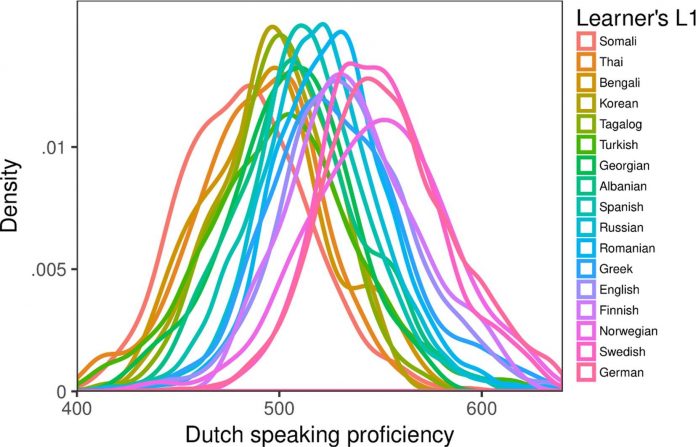How far does a language learner’s first language (L1) influence proficiency in a new language? An international study has tried to find out by using the speaking scores of over 50,000 learners of Dutch taking state language exams, including speakers of 62 different languages from 12 language families.
The international study from the Universities of Berlin, Germany,Rochester,USAand Radboud University in the Netherlands, found it is possible to predict the extent to which a learner’s L1 will influence their proficiency in a new language
It is commonly accepted that it is easier to learn a language that is similar to the learner’s L1, than one that it is very different. But most comparisons have been made between Indo-European languages and a few East Asian languages such as Mandarin and Japanese–and the results cannot be generalised. You might expect that a French speaker would find Spanish easier than Mandarin. But how would they find learning Turkish compared to Swahili?
By using ‘big data’, very large datasets that can only be analysed using computerised statistical algorithms, the new study was able to quantify the degree of difficulty experienced by speakers of different L1s. For example, ‘onlythebest5percentofArabic leanersofDutchwerebetterthan the worst 50 per cent of German learners.’
L1 was not the only factor; age, education and length of exposure to Dutch all predicted some of the variation in scores.
However, the learner’s L1 accounted for 9-22 per cent of the variation in Dutch speaking proficiency. Further analysis showed this is due to the combined influence of phonological, morphological and lexical differences between the languages.
This study breaks new ground, as this method can be extended to identify just which specific differences are problematic for particular language pairs.
The study focussed on speaking proficiency in the first instance, as this creates an immediate impression on the listener, influencing employment prospects and judgement of the speaker. Learners can not alter their L1, but in future it may be possible to better target their learning.
REFERENCE
- Schepen, J., van Hout, R. and Jaeger, T. F. (2020) Big data suggest strong constraints of linguistic similarity on adult language learning. Cognition, 194: 104056 DOI: 1016/j.cognition.2019.104056





